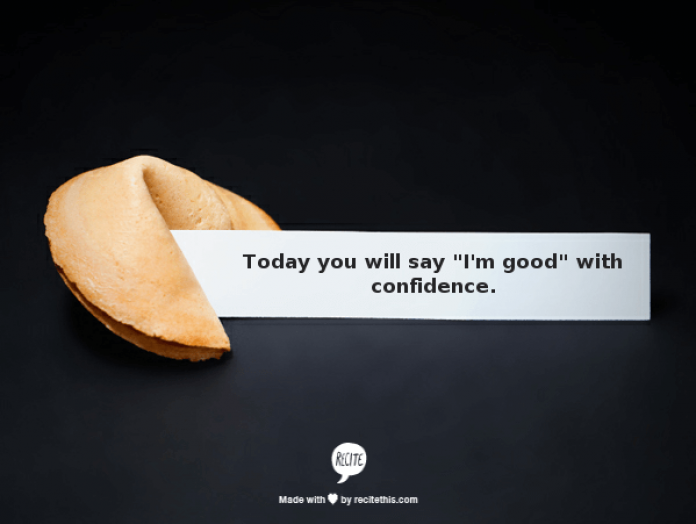Good Versus Well
Have you ever been chided for answering the question “How are you?” with “I’m good”? If so, here’s some vindication.

It’s such a simple little question: How are you? But I’ve heard from people who feel a twinge of trepidation or even full-blown frustration every time they have to decide whether to say they’re good or they’re well.
“I’m good” is what you’re likely to hear in general conversation, but there are grammar nitpickers out there who will chide you if you say it. The wonderful news is that those nitpickers are wrong: it’s perfectly acceptable to say, “I’m good,” and you shouldn’t have to shamefully submit to teasing remarks such as the time-honored and leering, “How good are you?”
Say “I’m Good” with Confidence
The nitpickers will tell you that “well” is an adverb (and therefore modifies verbs) and that “good” is an adjective (and therefore modifies nouns), but the situation isn’t that simple.
The key is to understand how linking verbs differ from action verbs. (Trust me, this is worth it so you can look people in the eye and say, “I’m good,” with absolute confidence.)
First, let’s talk about action verbs. They’re easy; they describe actions. Verbs such as “run,” “jump,” and “swim” are all action verbs. If you want to describe an action verb, you use an adverb like well. You could say: “He runs well”; “She jumps well”; “They swim well.” “Well” is an adverb that relates to all those action verbs.
Linking verbs, on the other hand, are more complicated. Linking verbs aren’t about actions as much as they are about connecting other words together. (1, 2) They’re also sometimes called “copulative verbs.”
I think of the verb “to be” as the quintessential linking verb. The word “is” is a form of the verb to be, and if I say, “He is yellow,” the main purpose of “is” is to link the word “he” with the word “yellow.” Other linking verbs include “seem,” “appear,” “look,” “become,” and verbs that describe senses, such as “feel” and “smell.” That isn’t a comprehensive list of linking verbs—there are at least 60 in the English language (1)—but I hope that will give you an idea of how they work.
One complication is that some verbs—such as the sensing verbs—can be both linking verbs and action verbs. (2, 3) A trick that will help you figure out if you’re dealing with a linking verb is to see if you can replace the verb with a form of to be; if so, then it’s probably a linking verb. (1, 4) For example, you can deduce that “feel” is a linking verb in the sentence “He feels bad” because if you replace feels with the word “is,” the sentence still makes sense: “He is bad.” On the other hand, if you have a sentence such as “He feels badly,” and you replace “feels” with “is,” it doesn’t make sense anymore: You get “He is badly.” So in that case you know that “feel” is functioning as an action verb.
Why Saying “I’m Good” Is OK
Now you understand the difference between linking verbs and action verbs. That might seem like a detour on the way to learning why it is OK to say, “I’m good,” but it’s important because the thing people seem to forget is that it’s standard to use adjectives—such as “good”—after linking verbs. (5, 6) When you do it, they are called predicate adjectives, and they refer to the noun before the linking verb. That’s why, even though “good” is primarily an adjective, it is OK to say, “I am good”: am is a linking verb, and you can use adjectives after linking verbs.
Aside from the linking-verb-action-verb trickiness, another reason people get confused about this topic is that “well” can be both an adverb and a predicate adjective. As I said earlier, in the sentence “He swam well,” “well” is an adverb that describes how he swam. But when you say, “I am well,” you’re using “well” as a predicate adjective. That’s fine, but most sources say “well” is reserved to mean “healthy” when it’s used in this way. (1, 3, 4) So if you are recovering from a long illness and someone is inquiring about your health, it’s appropriate to say, “I am well,” but if you’re just describing yourself on a generally good day and nobody’s asking specifically about your health, a more appropriate response is, “I am good.”
Finally, it’s very important to remember that it’s wrong to use “good” as an adverb after an action verb. For example, it’s wrong to say, “He swam good.” Cringe! The proper sentence is “He swam well,” because “swam” is an action verb and it needs an adverb to describe it. Remember, you can only use adjectives such as “good” and “bad” after linking verbs, you can’t use them after action verbs.
In another episode I’ll discuss the difference between bad and badly.
This article originally appeared April 20, 2007.
Download the Chapter on “Dirty Words” From Grammar Girl’s Book
Good” versus “well” is just one of the many confusing word choices that Mignon Fogarty covers in the “Dirty Words” chapter of her book, Grammar Girl’s Quick and Dirty Tips for Better Writing. You can download the chapter by clicking here.
You can order a copy of the paperback edition from any of these online retailers or pick one up at your favorite bookstore:
The book is also available in an e-book edition. You can download a copy wherever e-books are sold.
References
- Morris, M. and Morris, W. Harper Dictionary of Contemporary English Usage. New York: Harper & Rowe, 1995, p. 359.
- Lynch, J. “Linking Verbs.” The Lynch Guide to Grammar. andromeda.rutgers.edu/~jlynch/Writing/l.html(accessed April 20, 2007)
- Anson, C. M., Schwegler, R. A., and Muth, M. F. The Longman Pocket Writer’s Companion, second edition. New York: Pearson Education, 2006, p. 157.
- Brockenbrough, M. “Martha Talks Back.” Encarta, https://urltea.com/1eem (accessed April 20, 2007)
- Thurman, S., The Only Grammar Book You’ll Ever Need. Avon: Adams Media, 2003, p. 41.
- Scharton, M. and Neuleib, J. Things Your Grammar Never Told You. Second edition. New York: Pearson Education, 2001, p. 37.
Additional Sources
- Nelson, S. “10 Useful Hints for Everyday Grammar.” The Stranger, September 26, 2002. www.thestranger.com/seattle/Content?oid=12084 (accessed April 20, 2007)
- The Guide to Grammar and Writing “Some Adjectival Problem Children.” Hartford: Capital Community College Foundation, grammar.ccc.commnet.edu/grammar/adjectives.htm#good (accessed April 20, 2007)
- Curzan, A. “I am Good?” College of Literature, Science, and the Arts website, University of Michigan. https://www.lsa.umich.edu/lsa/archives/ci.iamgood_ci.detail (accessed October 24, 2012)
- “good.” Merriam-Webster Dictionary of English Usage. 1994. Merriam-Webster, Incorporated: Springfield, Mass. p.480.
- Wilson, K.G. “good.” Columbia Guide to Standard American English. 1993. Columbia University Press: New York. pp. 213-214.
- “good, well.” AP Stylebook, online edition. https://www.apstylebook.com/online/?do=entry&id=1296&src=AE (accessed March 21, 2013).






